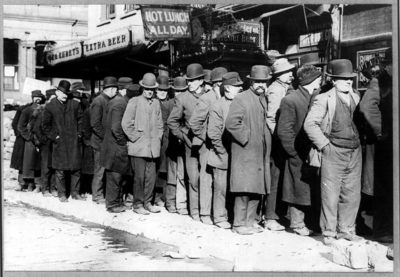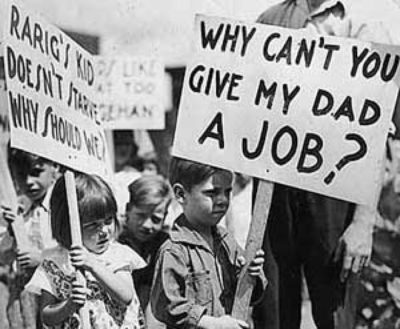 Of the many tragedies which have struck our nation through the years, the Great Depression of was the longest lasting and in many ways the most severe.
Of the many tragedies which have struck our nation through the years, the Great Depression of was the longest lasting and in many ways the most severe.
Few people made it through those trying years without feeling its impact. Millions of families lost jobs and homes, and even those who lost neither one often felt the pinch of hard financial times.
But even in the midst of those trying times, there were those who emerged victorious. Mostly, those were people who did not let the circumstances get them down, but instead sought ways of overcoming it. A large number of today’s well-known corporations were founded in those years, attesting to the indomitable spirits of their founders.
There are many who are saying that we are standing on the brink of the next great depression, and that our national economy is being held up by a flimsy house of cards.
New Survival Seed Bank™ Lets You Plant A Full Acre Crisis Garden!
Perhaps there is wisdom from that last Great Depression we all should learn:
1. Make things last
We live in a largely consumer society, always buying the latest and greatest of everything – cars, clothes, toys. But when you don’t have money to replace it, you need to make do with what you have.
Not only that, but you need to make sure that what you have will last as long as possible. That means properly taking care of everything. If the cost of a pair of pants is going to put a strain in the budget, then you’d better make sure you can wear those pants for as long as possible. For example, don’t put your keys in your pockets, because they might wear a hole in them. Don’t put your change there either, for the same reason. Instead, use a leather change purse that won’t wear through the fabric.
The same can be said for anything. Preventative maintenance will make any car last longer, yet thousands of cars per year end up in the junkyard, simply for ignoring the need to change the oil.
2. Fix it, don’t replace it
 Not only are we consumers, but we’re consumers that are accustomed to throwing things away. Long gone are the days of the local “fix-it shop,” where you could get just about anything repaired. Today, we throw it away and buy another one. That’s one thing if it’s a $5 item, but people do it with smartphones that cost hundreds of dollars, too.
Not only are we consumers, but we’re consumers that are accustomed to throwing things away. Long gone are the days of the local “fix-it shop,” where you could get just about anything repaired. Today, we throw it away and buy another one. That’s one thing if it’s a $5 item, but people do it with smartphones that cost hundreds of dollars, too.
Many things that break can be fixed, at times simply by scavenging parts from another one. Yet few people do this anymore. But when money becomes tight, this is a great way of making the dollars you have stretch a little bit farther.
3. Don’t pay someone to do what you can do yourself
A generation ago, most young men grew up learning some basic auto mechanics, carpentry and plumbing from their dads. By the time they moved out of their parents’ home, they’d have their own tool kit, filled with a combination of their father’s pass-me-downs and a few new ones that they’d bought on their own. They were proud of their ability to do things on their own.
Discover The World’s Healthiest Storable Survival Food!
Today, not enough young men graduating high school or college have any tools, let alone the knowledge to use them properly. They pay someone else to do it, rather than learning how to do it. While this might be good for the economy overall, it’s not good for their personal economy.
Buying tools and learning how to use them is an investment. If you hire a plumber to replace a faucet, it will cost an average of $242. But you can buy the tools to do it yourself for less than $40. So you save over $200 on that faucet replacement. Not only that, but every faucet you replace after that doesn’t cost you a penny for tools or labor.
4. Raise your own food
Other than the wealthy, the people who were impacted the least during the Great Depression were those who grew their own food. Millions of people had a vegetable garden and a henhouse behind their home. At a minimum, they would be growing some vegetables and have a steady source of eggs to feed their families. While that may not be much of a diet, when you don’t have a job, it can seem like food fit for a king.
5. Learn how to cook
Speaking about food fit for a king, we’re losing the art of knowing how to cook. We are used to using instant meals, frozen foods and “just add meat” packaged mixes. That’s great and it’s convenient, but when you don’t have the meat to add or the right ingredients to add to the packaged meal, it comes out rather flat.
Truly knowing how to cook means knowing how to make something well worth eating out of the ingredients you have available. How many people today know what to do if they don’t have butter or margarine to use in a recipe? What can you use if you don’t have enough flour? How can you turn that milk into yogurt or cheese, instead of letting it go to waste?
True cooks can turn simple ingredients into that meal fit for a king. They know how to get the most out of their spice cabinet and what they can do to make a disastrous recipe turn out anyway. Those skills can do a lot for the family’s morale and nutrition in hard times.
6. Avoid buying on credit
 Credit kills during a financial downturn. Those who lost fortunes in the Great Depression were those who had bought everything on credit. When they couldn’t pay, their creditors came to repossess what they had bought. Many went from rich to poor in the blink of an eye.
Credit kills during a financial downturn. Those who lost fortunes in the Great Depression were those who had bought everything on credit. When they couldn’t pay, their creditors came to repossess what they had bought. Many went from rich to poor in the blink of an eye.
The same can happen at any moment. The banks and creditors of today are not more hesitant to demand payment than those of the past. When you can’t pay, you lose.
7. Avoid self-indulgence
In the last 20 or 30 years we’ve been faced with a new phenomenon here in the United States — that of buying indulgent foods. We think nothing of spending $7 for a cup of coffee or an ice cream. Yet, it wasn’t all that long ago that we wouldn’t think of doing such a thing, except for the most special of occasions.
Our self-indulgence isn’t limited to our food, either. Designer clothing, fancy cars, elaborate cell phones and a host of other products are a normal part of everyday life. Many of the things we think of as “normal” today would have been luxuries to our parents, if they even existed.
Ready For Deflation? This New Solar Backup Generator Delivers 4 Times More Power Than Other Models
Each of those indulgences is a liability. When tough times come, they become a burden on your budget. Countless people who qualify as poor pay $100 cell phone bills. They have put a luxury in front of their necessities. That’s a recipe for financial disaster, especially when times get hard.
8. Save, save, save
The Great Depression was marked by the Stock Market Crash of 1929. That crash was caused mostly by people who bought stocks on “margin,” putting up only a small percentage of the value in hard assets. When they lost on the market, they didn’t have the money to pay their losses. This happened countless times, as people who didn’t really know the market became rich on it. But they didn’t cash in when they should have, and went from rich to poor in one afternoon of bear markets.
Had those same people put the money they had invested in savings, they would have survived the crash. Not only that, but they would have had money to feed their families and pay their mortgages, when others did not.
9. Keep your chin up
No matter how bad the situation is, you can always do something to make it better. I mentioned earlier that there were many great businesses which were founded during the Great Depression. That wasn’t an accident. These were men and women who spat in the eyes of destiny. They decided that they weren’t going to become part of the depression and made some bold moves. But they had the guts and the drive to make it happen.
I don’t care what survival situation you might face. The thing that will do the most to see you through is to stare the problem in the eye and laugh. You can overcome if you are convinced that you can. But if you are convinced that you can’t, you’ve already lost the battle.
What lessons would you add to this list? Share your thoughts in the section below:
 Off The Grid News Better Ideas For Off The Grid Living
Off The Grid News Better Ideas For Off The Grid Living



